STATEHOUSE REPORT | ISSUE 20.39 | SEPT. 24, 2021
BIG STORY: End of eviction moratorium may hurt thousands in S.C.
NEWS BRIEFS: Court upholds most of Heritage Act
LOWCOUNTRY, Ariail: Waiting
COMMENTARY, Brack: Congress must help Lejeune toxic water victims
SPOTLIGHT: S.C. Farm Bureau
MY TURN, Pendarvis: Road reforms bode well for state’s future — if we stick to it
FEEDBACK: House needs to be more transparent about redistricting
MYSTERY PHOTO: Take a stroll
End of eviction moratorium may hurt thousands in S.C.
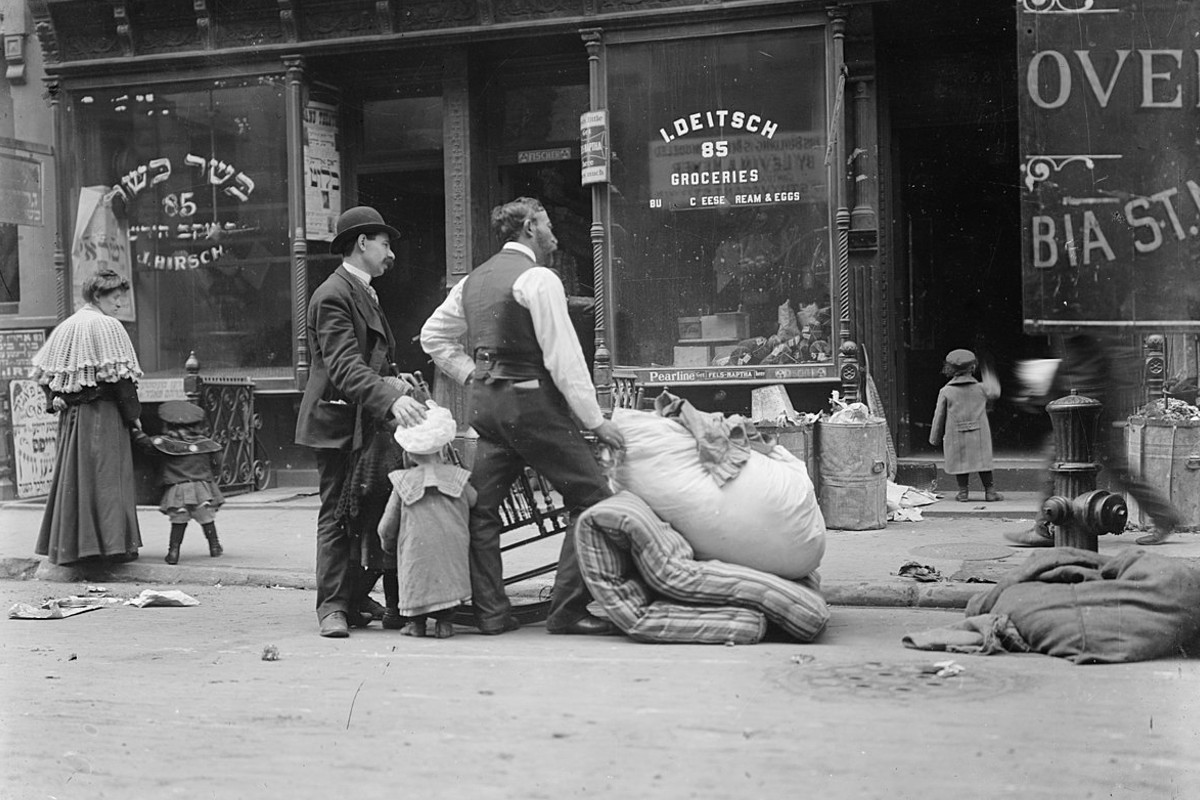
By Skyler Baldwin, special to Statehouse Report | Housing services, nonprofit organizations and advocacy groups throughout South Carolina say they are dealing with staggering numbers of renters facing potential eviction after the end of a moratorium that had kept thousands safely housed through financial hardships levied by the pandemic.
“We’re seeing increases across the board — everyone who has any sort of stake in housing, supporting housing, increasing inventory, anything, everybody is seeing an increase,” said Charleston Pro Bono attorney Nicole Paluzzi. “It’s almost all related to eviction for nonpayment of rent or rental assistance.”
Before the pandemic and subsequent eviction moratorium, South Carolina was already deeply entrenched in a housing crisis — evicting more tenants per capita than any other state from 2000 to 2016, according to a study by Princeton University’s Eviction Lab. And now, landlords have the green light to let off the brakes.
The Centers for Disease Control’s federal eviction moratorium helped to prevent 1.55 million eviction filings in the United States, according to estimates by Eviction Lab researchers based on an analysis over the 11-month moratorium period. In Charleston, evictions are down dramatically compared to the period before the pandemic.
In late August, the U.S. Supreme Court struck down a federal eviction moratorium about a month ahead of its expiration in early October.
Now, rent issues are coming home to roost. Roughly 739,067 rental households in S.C. are behind on rent or report low confidence in ability to pay rent, with 107,652 households reporting no confidence at all as of Sept. 17, according to U.S. Census Pulse data. Of renters behind on payments, 152,612 reported they would likely be evicted within the next two months.
Assistance available in S.C.
 The South Carolina State Housing Finance and Development Authority (S.C. Housing) has distributed more than $19 million in rental assistance through its SC Stay Plus program, launched in May in preparation for the end of the initial eviction moratorium. And plenty more is still available, with $272 million allotted to the program by the U.S. Department of Treasury.
The South Carolina State Housing Finance and Development Authority (S.C. Housing) has distributed more than $19 million in rental assistance through its SC Stay Plus program, launched in May in preparation for the end of the initial eviction moratorium. And plenty more is still available, with $272 million allotted to the program by the U.S. Department of Treasury.
“Our program, and others like it … will help people go back and pay that past-due rent, even if they’ve already been evicted,” said S.C. Housing chief communications officer Chris Winston in Columbia. “Otherwise, it’s almost impossible to find safe housing anywhere else.”
The SC Stay Plus program had given money to more than 4,000 households in the state as of Sept. 9, Winston said. Separate programs funded by the U.S. Department of Housing and Urban Development had distributed an additional $10 million.
The state General Assembly tasked S.C. Housing as the administrator of the state and federal programs, but counties with populations over 200,000 can apply to run separate local programs. Charleston and Berkeley counties both operate local programs. Charleston’s Emergency Rental Assistance Program (ERAP) was awarded $12.4 million from the U.S. Treasury to stabilize housing in the county.
Renters in need of assistance can fill out applications online, and assistance provided by S.C. Housing’s averages about $4,000 per household.
“Our focus is on people who may be at risk now who are being evicted,” Winston said. “And you can self-attest all of those items. If you’ve been impacted by COVID financially, and you say you’re at risk of being evicted, we don’t require any sort of documentation for that anymore. We want people to get their applications in.”
Too little, too late, sometimes
Despite millions of dollars available in financial assistance, some couldn’t get enough to cover their debts — others sought help too late.
Paluzzi, who works closely with the Charleston Housing Court to keep tenants in homes, said she is seeing numbers roughly consistent with the previous peak, seen in January.
“We knew it was coming, and when it came, it hit hard,” she said. Even with as much outreach and information sharing as possible, Paluzzi said, not everyone was able to avoid an eviction notice. “There are just limitations to getting the information out to the individual.”
Paluzzi said Charleston Pro Bono tracked roughly 85-100 eviction cases in previous years. The county will likely see triple that total this year, despite evictions having been on hold until August.
- Baldwin is a staff reporter with the Charleston City Paper, where this story first appeared. Have a comment? Send to feedback@statehousereport.com
Court upholds most of Heritage Act

Staff reports | The S.C. Supreme Court ruled Wednesday that the Heritage Act, which prevents removal or changing of public monuments or names without the legislature’s approval, is legal. However, the same ruling struck down the two-thirds majority needed in the General Assembly to make the removal or name change.
State Sen. Gerald Malloy, the Hartsville Democrat who represented a client in the case, said the reversal of the needed two-thirds vote was a victory because, “The voice of the majority can now be heard.” More: AP News, Spartanburg Herald-Journal, The State, The Orangeburg Times & Democrat, The Post and Courier
The State newspaper said in an editorial that the ruling would hurt home rule in which local governments get to decide local issues: “Unfortunately, thanks to the Heritage Act of 2000, the decision to relocate, remove, disturb or alter those monuments and memorials is still in the hands of the state Legislature, an ongoing blow to the state’s treasured concept of home rule.”
In other news:
![]() S.C. docs tell lawmakers their struggles in treating COVID-19. Hospital systems and doctors told state lawmakers this week that they would increase access to COVID-19 antibodies if they could but the demand is outstripping supply. More: The Post and Courier, The State, Spartanburg Herald-Journal. Meanwhile in South Carolina, health officials on Thursday reported 3,165 total cases of COVID-19 with 2,202 confirmed. A total of 44 new deaths, with 39 confirmed, were also reported Thursday. With 24,310 tests reported, 12.4 percent were confirmed positive.
S.C. docs tell lawmakers their struggles in treating COVID-19. Hospital systems and doctors told state lawmakers this week that they would increase access to COVID-19 antibodies if they could but the demand is outstripping supply. More: The Post and Courier, The State, Spartanburg Herald-Journal. Meanwhile in South Carolina, health officials on Thursday reported 3,165 total cases of COVID-19 with 2,202 confirmed. A total of 44 new deaths, with 39 confirmed, were also reported Thursday. With 24,310 tests reported, 12.4 percent were confirmed positive.
Medical workers, teachers struggle with COVID issues. More stories are cropping up about pandemic struggles faced by medical workers and teachers as they deal with another surge of COVID-19. Not only is a statewide mask ban at schools interfering with learning as schools may bounce between in-person and virtual classes, but the third surge of the virus is causing pain and frustration as hospitals are packed and more people continue to get the virus. Even worse — people with other medical conditions may not get the care they need because of so many COVID patients in hospitals. More: The State, The Post and Courier, Associated Press, The Washington Post, The New York Times.
FEMA changes to spike cost of insuring waterfront homes. New federal flood insurance rates that better reflect the real risks of climate change are coming. For some homeowners, premiums will rise sharply. More: The New York Times.
S.C. lawyer-legislators receive ‘absolute protection,’ delaying trials. As a result of orders from the top judge in South Carolina, defendants who hire some lawmakers to serve as their defense attorneys could have their trials delayed indefinitely. More: WCSC TV.
Cunningham says he has ‘best chance’ of beating McMaster. Former Congressman Joe Cunningham, the Democratic hopeful for South Carolina governor, didn’t waste time Thursday getting to know Chester County voters. More: The State.
Port volumes remain strong for August. The S.C. Ports Authority handled 114,671 import containers in the month of August. That amount represents an 18% year-over-year increase over last year. More: Charleston Regional Business Journal.
S.C. municipalities face threats from cyberattacks. Cities and towns in South Carolina are facing an increased onslaught of attacks that have shut some of them down as criminals demand monetary payment for a return of services. More: WBTW.
- Want more headlines every business day that are like this? Visit our friends at SC Clips.
Waiting
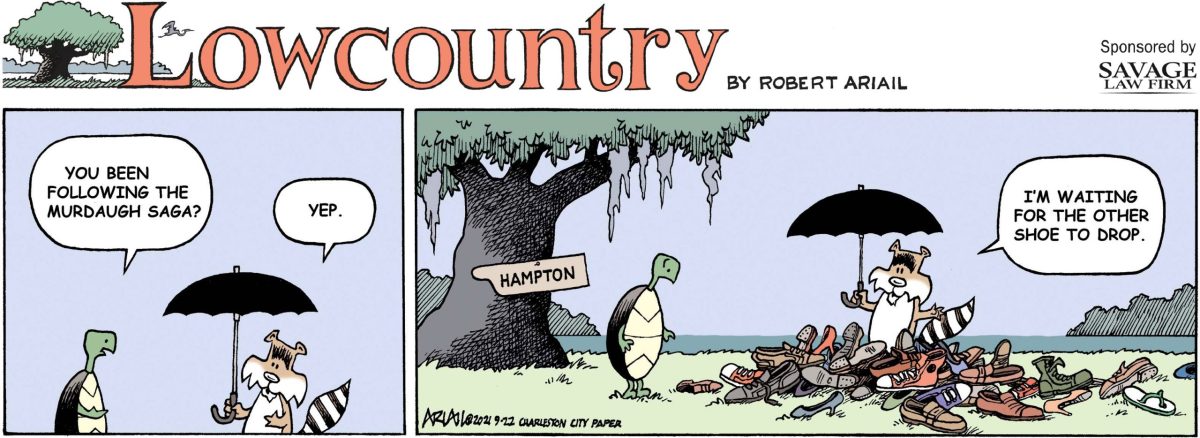
Cartoonist Robert Ariail always has an interesting take on what’s going on in South Carolina. His weekly “Lowcountry” strip is originally drawn for our sister publication, the Charleston City Paper. Love the cartoon? Hate it? What do you think: feedback@statehousereport.com. Check out the Best of Charleston 2021.
Congress must help Lejeune toxic water victims
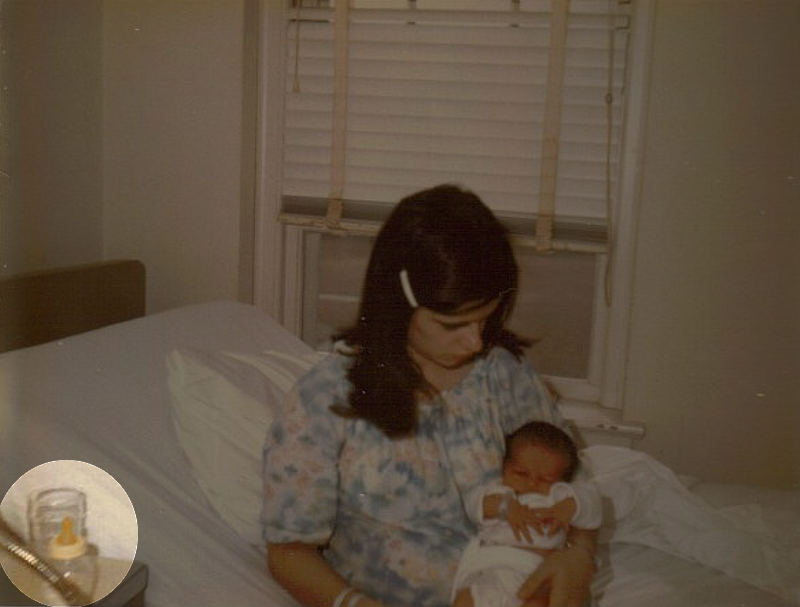
By Andy Brack, editor and publisher | They drank the water. And it’s been killing them.
 Retired Navy Chaplain Bruce Hill (see video) of Lakeland, Fla., had five years of treatment before his leukemia went into remission. His wife died of breast cancer. His daughter suffers from an inflammatory bowel disease that compromises her body’s immune system. They all drank the water.
Retired Navy Chaplain Bruce Hill (see video) of Lakeland, Fla., had five years of treatment before his leukemia went into remission. His wife died of breast cancer. His daughter suffers from an inflammatory bowel disease that compromises her body’s immune system. They all drank the water.

On the day that Mike Partain of Winter Haven, Fla., was born in a base hospital at Camp Lejeune in North Carolina, he, too, drank the water. You can see a baby bottle half-filled with water in the foreground of a picture in my office that shows Mike’s mother holding him hours after he was born.
“If it hadn’t been for a fortunate hug, I’d probably be dead now,” Mike said earlier this year (see video). “I had breast cancer. I’m one of 125 men who had the unique commonality of exposure to the contaminated water at the base and male breast cancer.
“I do not drink. I do not have the BRCA 1 and 2 mutations for breast cancer…. I don’t do drugs. There’s no history of breast cancer in my family. But yet, I get a rare disease but it’s tied to these chemicals.”

From 1953 to 1987, more than 900,000 Marines, their families and civilian employees at Camp Lejeune drank water contaminated by toxic chemicals like gasoline and jet fuel that leaked into wells around the base. Across the country, 273,433 people have registered with the Marine Corps to receive notifications about the poisonous drinking water at Camp Lejeune. More than 7,600 live in South Carolina.
In the 1960s and 1970s at the base, “levels of certain cancer-causing chemicals were among the highest ever recorded in a public drinking water supply,” according to a 2013 Associated Press story.
People like Bruce and Mike got sick. Too many died from diseases like leukemia and cancer — rectal cancer, breast cancer, cervical cancer, ovarian cancer, brain cancer, kidney cancer. Often, it took years for devastating diseases to manifest.
What makes the whole mess even sadder is that the military knew about it for years, but did nothing. All the while, Marines protecting their country had no idea they were battling an invisible enemy — an enemy in the water underneath the homes in which they lived, the offices where they worked, the fields in which they trained.
By 2012, Congress passed a measure to provide limited health care relief for Camp Lejeune veterans, but the law didn’t provide substantial and equitable relief or reimbursement for military dependents and civilian employees who suffered from drinking the polluted water. In other words, some health treatments were covered, but not claims for other damages from victims. Why? Because of a quirk in North Carolina’s law that courts said must be applied before cases could be brought. That limitation has kept those affected by the water from having their day in court.
The only way that’s left to deal with this aberration in North Carolina’s law is for Congress to pass a special bill, the Camp Lejeune Justice Act. If passed, the measure would allow Marines, their families and civilian workers at Camp Lejeune who either consumed or bathed in toxic water for at least 30 days between August 1953 and December 1987 to seek damages and, if denied, to file a lawsuit.
More than 50 members of Congress currently co-sponsor the legislation, but it’s been crawling at a snail’s pace.
Congress, now is the time to get the job done. No more messing around. No more political side steps. Victims and families have suffered for too long. More are dying without relief. Honor the Marines and other sickened victims of this tragic poisoning now by doing the right thing and letting them seek the recovery and peace they deserve.
They protected us. Now let’s do the right thing for them to rectify the toxic wrongs done to them.
- Have a comment? Send to: feedback@statehousereport.com.
S.C. Farm Bureau
 Statehouse Report is provided for free to thousands of subscribers thanks to the generosity of our underwriters. Today we shine a spotlight on our newest underwriter, S.C. Farm Bureau. It is a grassroots, non-profit organization that celebrates and supports family farmers, locally-grown food and rural lands through legislative advocacy, education and community outreach.
Statehouse Report is provided for free to thousands of subscribers thanks to the generosity of our underwriters. Today we shine a spotlight on our newest underwriter, S.C. Farm Bureau. It is a grassroots, non-profit organization that celebrates and supports family farmers, locally-grown food and rural lands through legislative advocacy, education and community outreach.
S.C. Farm Bureau’s alliance of nearly 100,000 members includes everyone from foodies and fishermen to lawyers, restaurateurs, entrepreneurs, community leaders, and of course, farmers. By connecting farmers to the larger community, the organization cultivates understanding about agriculture’s importance to our local economies. The S.C. Farm Bureau explains its mission: “We deepen our collective knowledge of who, where and how food grows. We empower people to make informed choices. We grow mutually-beneficial relationships. And, we ensure the future of the family farms, locally-grown food and the rural South Carolina lands we love.”
- To learn more about S.C. Farm Bureau’s programs, click here.
- To view media and publications, click here
- For policy and legislation, click here.
Road reforms bode well for state’s future — if we stick to it
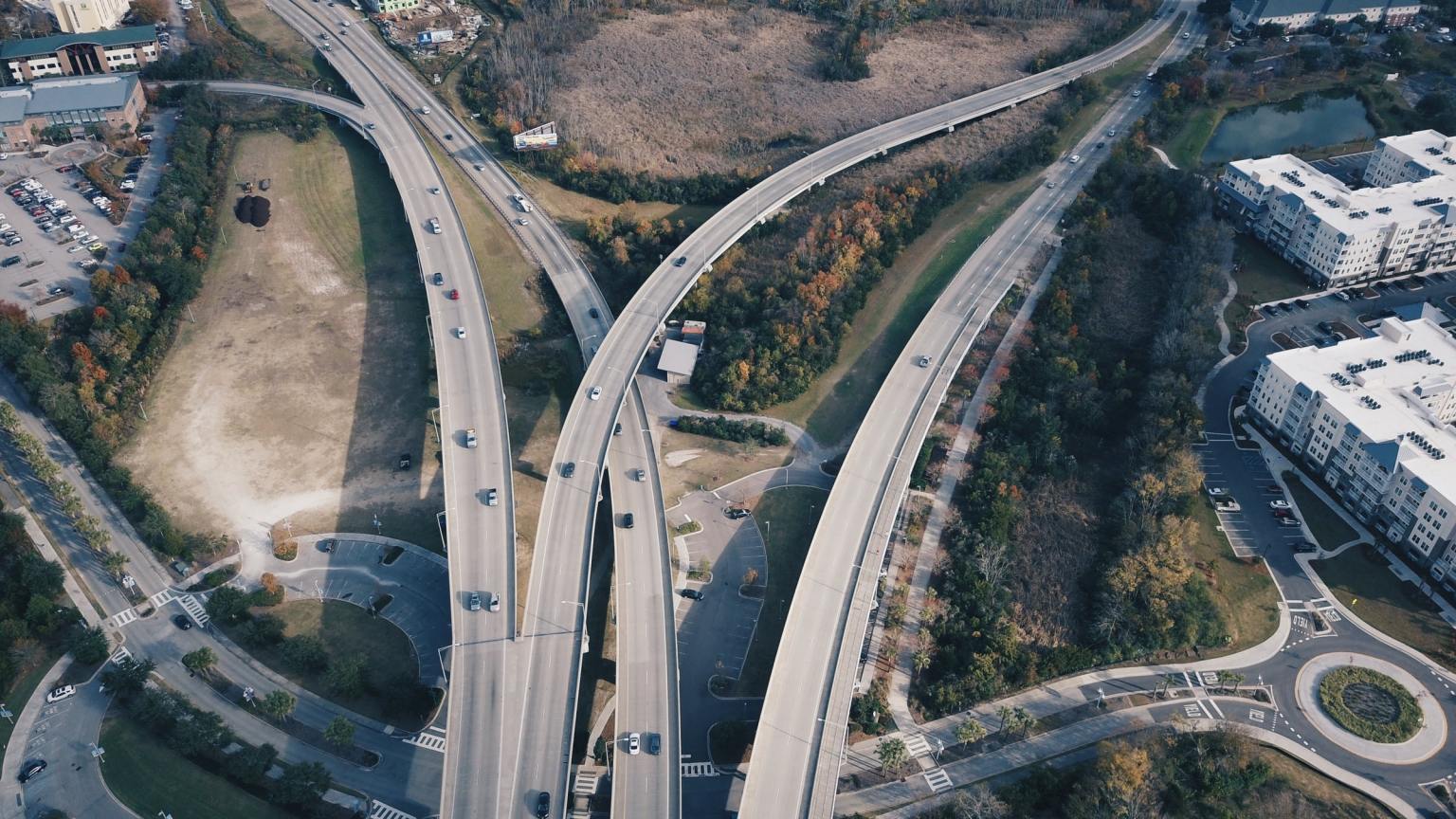
By S.C. Rep. Marvin Pendarvis | Facing a future characterized by natural disasters induced by climate change, it is our responsibility to be as environmentally responsible as possible. Posterity will judge us for what we do now and the lives of countless innocent people depend on it. That is why it is so heartening to see the progress our Department of Transportation has made in recent years in terms of improving bicycle and pedestrian paths.

Blazing a trail many other agencies could follow, and giving reasons for optimism that in the near future, green options for transportation will be the norm in South Carolina, making it easier for everyone to participate in saving the planet.
Our greatest accomplishment on this front in the past year was the legislature’s passage of the state’s Complete Streets bill, which will reduce the necessity of carbon-based transportation by leaps and bounds. By ensuring most new roadways have bicycle paths and pedestrian walkways, we will have created a network of corridors connecting the entire state. The new connections will make walking and biking a plausible option for many who did not previously have easy non-car commutes to work or school. It will now be possible to make the majority of our transportation carbon-neutral.
Many of the improvements are not only to help commuters, but also to expand the recreational avenues across our area. The West Ashley Greenway (in Charleston), in particular, comes to mind. It is not only a benefit to our environment, but also the health of our citizens that free, clean and beautiful means of keeping an active lifestyle are expanded. Especially with the prospect of a pandemic with no foreseeable end due to anti-vax sentiment allowing for new variants to evolve and many other emerging health concerns. Staying healthy is no longer a personal virtue, but a public duty. To that end, it behooves us to make these improvements.
The end result of the trend these bills are forging will be a new South Carolina — a labyrinth of green alongside the old matrix of gray to dominate the significant portions of people’s lives spent commuting and exercising outdoors. Adjacent communities will no longer be separated from one another by major construction projects, as has happened with a focus on car-first transportation policy. This will be a place where the air, the land, the wetlands and the waterways will be cleaner, and without oil runoff and exhaust fumes currently poisoning our region. In short: We are making South Carolina a healthier, more verdant and more vibrant place.
For a state known by all the metrics in which it lacks progress, these changes are a pleasant counter to that narrative. They’re an indication that South Carolina could soon proudly claim designations reserved for the places that score high in quality of life, the environment and human vitality. These are small steps in the direction of transforming this place into one known for its hope and for the glowing radiance of its human goodness. With a little more work, people will look here to see a vision for what this country could be and an example for other communities to follow.
Pendarvis, an attorney, represents District 113 in the Charleston area in the S.C. House of Representatives. Have a comment? Send to: feedback@statehousereport.com
House needs to be more transparent about redistricting
To the editor:
![]() Thank you for your excellent article on redistricting. If it is true as Mr. Jordan states that they heard no testimony regarding the flawed process the S.C. House is undertaking in redistricting at their first hearing, it is certainly not true of the most recent hearing held in Bluffton.
Thank you for your excellent article on redistricting. If it is true as Mr. Jordan states that they heard no testimony regarding the flawed process the S.C. House is undertaking in redistricting at their first hearing, it is certainly not true of the most recent hearing held in Bluffton.
Public witness after public witness spoke to their concerns about the lack of transparency, not only in the process but also in the conducting of the public hearings. For example, unlike the Senate Redistricting Committee, virtual testimony was not allowed (in a time when many were concerned about sitting in a closed auditorium for two2 hours with no mask requirement), the hearings are not being broadcast through the state legislative channel (so how do we even know what is being said in the public hearings outside our immediate area?), and the Bluffton hearing was held prior to sundown on the most important Jewish religious holiday of Yom Kippur.
Witnesses also testified to the multiple split precincts and communities in the Beaufort County area — all of which occur in the minority-majority areas — and the impact of these split communities on the voices of the African American and Latinx communities in our statehouse.
Data was provided that detailed this gerrymandering in great detail. I am hopeful that the Senate and House Committees will take the multiple comments provided into consideration when they draw their maps but at the same time, my expectations are low. The fact that the House committee adopted its redistricting criteria without public input — and before their public meetings and again will not be allowing public comment after they draw their maps does not provide much optimism to the impact of public comment on the process.
— Chris deVries, Hilton Head Island, S.C.
Send us your thoughts
We receive a few comments a week and look forward to publishing. But often we can’t because we can’t verify the identity of the writer. To be published, you’ve got to provide us with contact information so we can verify your letters. Verified letters to the editor are published weekly. We reserve the right to edit for length and clarity. Comments are limited to 250 words or less. Please include your name and contact information.
- Send your letters or comments to: feedback@statehousereport.com
Take a stroll
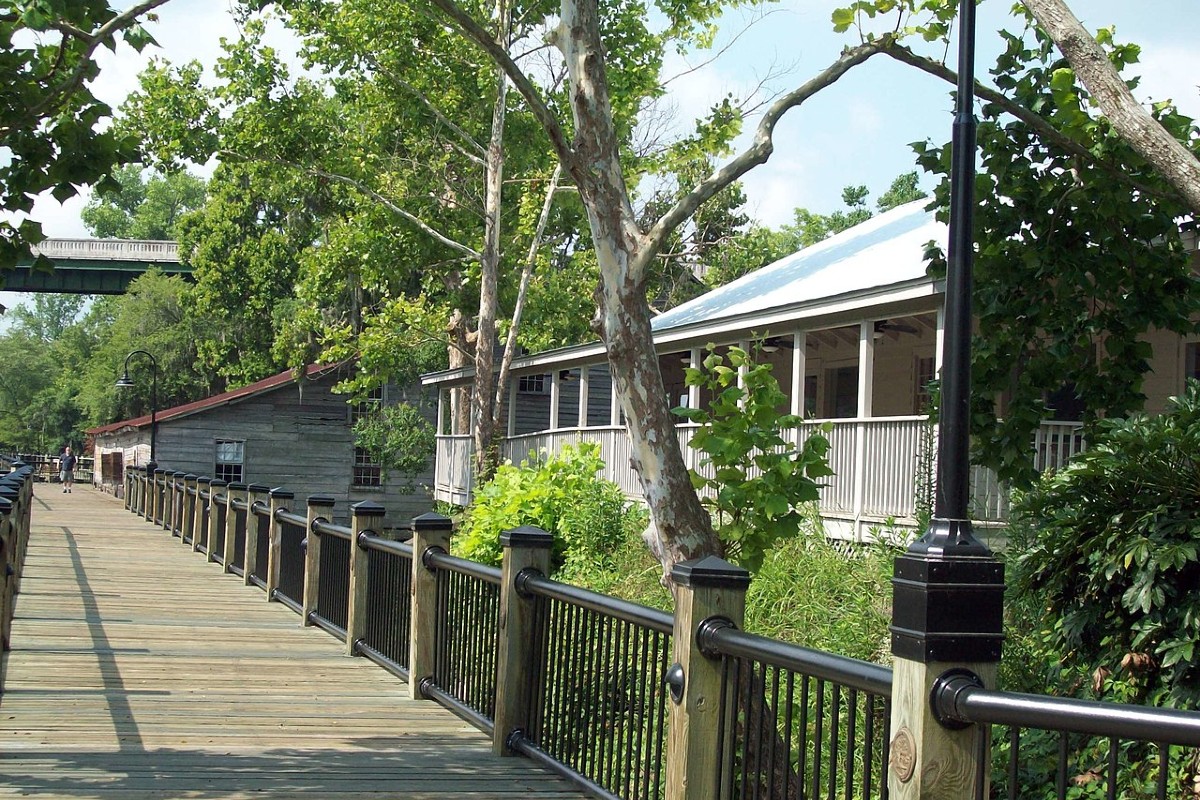
Where’s this photo with a great-looking boardwalk on which to stroll? Send your guess to feedback@statehousereport.com — and remember to include your name, home city and contact information.
 Last week’s mystery: We got lots of great guesses for last week’s photo, which was taken from the “Wonder Way” pathway on the Ravenel Bridge in Charleston looking west. Up to 25,000 runners are expected on the bridge Saturday during the Cooper River Bridge Run. See a special “fun” section here about the race.
Last week’s mystery: We got lots of great guesses for last week’s photo, which was taken from the “Wonder Way” pathway on the Ravenel Bridge in Charleston looking west. Up to 25,000 runners are expected on the bridge Saturday during the Cooper River Bridge Run. See a special “fun” section here about the race.
Congratulations to all of these sleuths for correctly identifying it: Daniel Prohaska and Frank Bouknight, both of Summerville; Irving Rosenfeld of James Island; Rep. Cezar McKnight of Kingstree; Susan L. John of Conway; Allan Peel of San Antonio, Texas; Pam Little-McDaniel of Florence; Tom Stickler of Pawleys Island; Will Bradley of Las Vegas, Nevada; David Taylor of Darlington; Kevin Mertens of Greenville; George Graf of Palmyra, Va.; Curtis Joyner of Charleston; and Anthony Lofton of Columbia.
- Send us a mystery. If you have a photo that you believe will stump readers, send it along (but make sure to tell us what it is because it may stump us too!) Send to: feedback@statehousereport.com and mark it as a photo submission. Thanks.
ORDER NOW: Copies are in Lowcountry-area bookstores now, but if you can’t swing by, you can order a copy online today.
ABOUT STATEHOUSE REPORT
Statehouse Report, founded in 2001 as a weekly legislative forecast that informs readers about what is going to happen in South Carolina politics and policy, is provided to you at no charge every Friday.
- Editor and publisher: Andy Brack, 843.670.3996
Donate today
We’re proud to offer Statehouse Report for free. For more than a dozen years, we’ve been the go-to place for insightful independent policy and political news and views in the Palmetto State. And we love it as much as you do.
But now, we can use your help. If you’ve been thinking of contributing to Statehouse Report over the years, now would be a great time to contribute as we deal with the crisis. In advance, thank you.
Buy the book
Now you can get a copy of editor and publisher Andy Brack’s We Can Do Better, South Carolina! ($14.99) as a paperback or as a Kindle book ($7.99). . The book of essays offers incisive commentaries by editor and publisher Andy Brack on the American South, the common good, vexing problems for the Palmetto State and interesting South Carolina leaders.
More
- Mailing address: Send inquiries by mail to: P.O. Box 21942, Charleston, SC 29413
- Subscriptions are free: Click to subscribe.
- We hope you’ll keep receiving the great news and information from Statehouse Report, but if you need to unsubscribe, go to the bottom of the weekly email issue and follow the instructions.
- Read our sister publications: Charleston City Paper (every Wednesday) | Charleston Currents (every Monday).
- © 2021, Statehouse Report, a publication of City Paper Publishing, LLC. All rights reserved.



